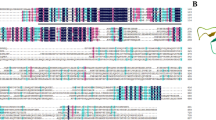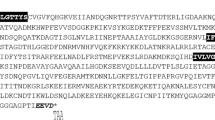Abstract
The Colorado potato beetle (Leptinotarsa decemlineata (Say)) is an agricultural pest that threatens the potato industry worldwide. This insect is widely regarded as one of the most difficult-to-control pests, as it can thrive in a wide range of temperature conditions and routinely develops resistance towards various insecticides. The molecular changes associated with response to these challenges have not been fully investigated in L. decemlineata. While differential expression and characterization of heat shock proteins (HSPs) in response to stress have been conducted in several insects, data regarding HSPs in L. decemlineata are limited. The overarching objective of this study consisted of evaluating the expression of various HSPs in L. decemlineata exposed to different temperatures or treated with the insecticides imidacloprid and chlorantraniliprole. Expression levels of HSP60, HSP70, HSP90, and HSP Beta-1 were evaluated by qRT-PCR and insect mortality was assessed using dsRNAs aimed at select HSP targets. Elevated HSP70 and HSP90 transcript levels were observed in heat-exposed L. decemlineata while downregulation of HSP70 transcript levels was measured in insects submitted to cold conditions. Chlorantraniliprole exposure was associated with reduced HSP Beta-1 transcript levels while no change in expression was monitored in insects exposed to imidacloprid. RNAi-based knockdown of HSP60 levels correlated with significant insect mortality 14 days after dsRNA injection. These results highlight the modulation of HSPs that occur in L. decemlineata exposed to fluctuating temperatures and position HSPs as interesting candidates in the identification of novel molecular leads that could be targeted to control this insect.





Similar content being viewed by others
References
Alyokhin A, Mota-Sanchez D, Baker M, Snyder WE, Menasha S, Whalon M, Dively G, Moarsi WF (2015) The Red Queen in a potato field: integrated pest management versus chemical dependency in Colorado potato beetle control. Pest Manag Sci 71(3):343–356
Arya R, Lakhotia SC (2008) Hsp60D is essential for caspase-mediated induced apoptosis in Drosophila melanogaster. Cell Stress Chaperones 13(4):509–526
Chen J, Kitazumi A, Alpuerto J, Alyokhin A, de Los Reyes B (2016) Heat-induced mortality and expression of heat shock proteins in Colorado potato beetles treated with imidacloprid. Insect Sci 23(4):548–554
Cheng W, Li D, Wang Y, Liu Y, Zhu-Salzman K (2016) Cloning of heat shock protein genes (hsp70, hsc70 and hsp90) and their expression in response to larval diapause and thermal stress in the wheat blossom midge, Sitodiplosis mosellana. J Insect Physiol 95:66–77
Colinet H, Rinehart JP, Yocum GD, Greenlee KJ (2018) Mechanisms underpinning the beneficial effects of fluctuating thermal regimes in insect cold tolerance. J Exp Biol 221(Pt 14):jeb164806
Derecka K, Blythe MJ, Malla S, Genereux DP, Guffanti A, Pavan P, Moles A, Snart C, Ryder T, Ortori CA, Barrett DA, Schuster E, Stöger R (2013) Transient exposure to low levels of insecticide affects metabolic networks of honeybee larvae. PLoS One 8(7):e68191
Ferro DN, Logan JA, Voss RH, Elkinton JS (1985) Colorado potato beetle (Coleoptera: Chrysomelidae) temperature-dependent growth and feeding rates. Environ Entomol 14(3):343–348
Hiiesaar K, Kuusik A, Jõudu J, Metspalu L, Hermann P (2001) Laboratory experiments on cold acclimation in overwintering Colorado potato beetles, Leptinotarsa decemlineata (Say). Nor J Entomol 48:87–90
Hiiesaar K, Metspalu L, Joudu J, Jogar K (2006) Over-wintering of the Colorado potato beetle (Leptinotarsa decemlineata Say) in field conditions and factors affecting its population density in Estonia. Agron Res 4:21–30
Izzo VM, Hawthorne DJ, Chen YH (2014) Geographic variation in winter hardiness of a common agricultural pest, Leptinotarsa decemlineata, the Colorado potato beetle. Evol Ecol 28:505–520
Ju RT, Luo QQ, Gao L, Yang J, Li B (2018) Identification of HSP70 gene in Corythucha ciliata and its expression profiles under laboratory and field thermal conditions. Cell Stress Chaperones 23(2):195–201
King AM, MacRae TH (2015) Insect heat shock proteins during stress and diapause. Annu Rev Entomol 60:59–75
Kostál V, Tollarová-Borovanská M (2009) The 70 kDa heat shock protein assists during the repair of chilling injury in the insect, Pyrrhocoris apterus. PLoS One 4(2):e4546
Li YY, Lu S, Li K, Feng JY, Li YN, Gao ZR, Chen CJ (2010) Down-regulation of HSP60 expression by RNAi increases lipopolysaccharide- and cerulein-induced damages on isolated rat pancreatic tissues. Cell Stress Chaperones 15(6):965–975
Li Y, Zhao Q, Duan X, Song C, Chen M (2017) Transcription of four Rhopalosiphum padi (L.) heat shock protein genes and their responses to heat stress and insecticide exposure. Comp Biochem Physiol A Mol Integr Physiol 205:48–57
Lü ZC, Wan FH (2011) Using double-stranded RNA to explore the role of heat shock protein genes in heat tolerance in Bemisia tabaci (Gennadius). J Exp Biol 214(Pt 5):764–769
Lu K, Chen X, Liu W, Zhang Z, Wang Y, You K, Li Y, Zhang R, Zhou Q (2017) Characterization of heat shock protein 70 transcript from Nilaparvata lugens (Stål): its response to temperature and insecticide stresses. Pestic Biochem Physiol 142:102–110
Lyytinen A, Mappes J, Lindstrom L (2012) Variation in Hsp70 levels after cold shock: signs of evolutionary responses to thermal selection among Leptinotarsa decemlineata populations. PLoS One 7(2):e31446
Mahroof R, Yan Zhu K, Neven L, Subramanyam B, Bai J (2005) Expression patterns of three heat shock protein 70 genes among developmental stages of the red flour beetle, Tribolium castaneum (Coleoptera: Tenebrionidae). Comp Biochem Physiol A Mol Integr Physiol 141(2):247–256
Morin MD, Frigault JJ, Lyons PJ, Crapoulet N, Boquel S, Storey KB, Morin PJ (2017a) Amplification and quantification of cold-associated microRNAs in the Colorado potato beetle (Leptinotarsa decemlineata) agricultural pest. Insect Mol Biol 26(5):574–583
Morin MD, Lyons PJ, Crapoulet N, Boquel S, Morin PJ (2017b) Identification of differentially expressed miRNAs in Colorado potato beetles (Leptinotarsa decemlineata (Say)) exposed to imidacloprid. Int J Mol Sci 18(12):2728
Nielsen MM, Overgaard J, Sorensen JG, Holmstrup M, Justensen J, Loeschke V (2005) Role of HSF activation for resistance to heat, cold and high-temperature knock-down. J Insect Physiol 51:1320–1329
Ostermann J, Horwich AL, Neupert W, Hartl FU (1989) Protein folding in mitochondria requires complex formation with hsp60 and ATP hydrolysis. Nature 341:125–130
Paim RMM, Araujo RN, Leis M, Sant'anna MRV, Gontijo NF, Lazzari CR, Pereira MH (2016) Functional evaluation of heat shock proteins 70 (HSP70/HSC70) on Rhodnius prolixus (Hemiptera, Reduviidae) physiological responses associated with feeding and starvation. Insect Biochem Mol Biol 77:10–20
Rinehart JP, Li A, Yocum GD, Robich RM, Hayward SA, Denlinger DL (2007) Up-regulation of heat shock proteins is essential for cold survival during insect diapause. Proc Natl Acad Sci U S A 104(27):11130–11137
Rodrigues TB, Duan JJ, Palli SR, Rieske LK (2018) Identification of highly effective target genes for RNAi-mediated control of emerald ash borer, Agrilus planipennis. Sci Rep 8(1):5020
Scott IM, Tolman JH, MacArthur DC (2015) Insecticide resistance and cross-resistance development in Colorado potato beetle Leptinotarsa decemlineata Say (Coleoptera: Chrysomelidae) populations in Canada 2008-2011. Pest Manag Sci 71(5):712–721
Shi M, Wang YN, Zhu N, Chen XX (2013) Four heat shock protein genes of the endoparasitoid wasp, Cotesia vestalis, and their transcriptional profiles in relation to developmental stages and temperature. PLoS One 8:e59721
Sun Y, Sheng Y, Bai L, Zhang Y, Xiao Y, Xiao L, Tan Y, Shen Y (2014) Characterizing heat shock protein 90 gene of Apolygus lucorum (Meyer-Dür) and its expression in response to different temperature and pesticide stresses. Cell Stress Chaperones 19(5):725–739
Tungjitwitayakul J, Tatun N, Vajarasathira B, Sakurai S (2015) Expression of heat shock protein genes in different developmental stages and after temperature stress in the maize weevil (Coleoptera: Curculionidae). J Econ Entomol 108(3):1313–1323
Wan PJ, Fu KY, Lü FG, Wang XX, Guo WC, Li GQ (2015) Knocking down a putative Δ(1)-pyrroline-5-carboxylate dehydrogenase gene by RNA interference inhibits flight and causes adult lethality in the Colorado potato beetle Leptinotarsa decemlineata (Say). Pest Manag Sci 71:1387–1396
Weber D (2003) Colorado beetle: pest on the move. Pestic Outlook 14:256–259
Zhang Q, Denlinger DL (2010) Molecular characterization of heat shock protein 90, 70 and 70 cognate cDNAs and their expression patterns during thermal stress and pupal diapause in the corn earworm. J Insect Physiol 56(2):138–150
Zhang G, Storey JM, Storey KB (2011) Chaperone proteins and winter survival by a freeze tolerant insect. J Insect Physiol 57(8):1115–1122
Zhang LJ, Wang KF, Jing YP, Zhuang HM, Wu G (2015) Identification of heat shock protein genes hsp70s and hsc70 and their associated mRNA expression under heat stress in insecticide-resistant and susceptible diamondback moth, Plutella xylostella (Lepidoptera: Plutellidae). Euro J Entomol 112:215–226
Funding
Support from a Discovery Grant from the Natural Sciences and Engineering Research Council of Canada (RGPIN-2018-05974) and a Research Grant (EARI 15-007) from the Enabling Agricultural and Research Innovation (EARI) program under the Canada/New Brunswick Growing Forward 2 initiative is acknowledged.
Author information
Authors and Affiliations
Corresponding author
Ethics declarations
Conflict of interest
The authors declare that they have no conflict of interest.
Additional information
Publisher’s note
Springer Nature remains neutral with regard to jurisdictional claims in published maps and institutional affiliations.
Electronic supplementary material
Figure S1
HSP60 and HSP70 expression in L. decemlineata following dsRNA injection. Histogram shows HSP60 and HSP70 transcript levels in dsRNA- or saline-injected L. decemlineata three days post-injection. Data are mean standardized transcript levels (mean ± SEM, n = 3). (PPTX 60 kb)
Rights and permissions
About this article
Cite this article
Dumas, P., Morin, M.D., Boquel, S. et al. Expression status of heat shock proteins in response to cold, heat, or insecticide exposure in the Colorado potato beetle Leptinotarsa decemlineata. Cell Stress and Chaperones 24, 539–547 (2019). https://doi.org/10.1007/s12192-019-00983-3
Received:
Accepted:
Published:
Issue Date:
DOI: https://doi.org/10.1007/s12192-019-00983-3




